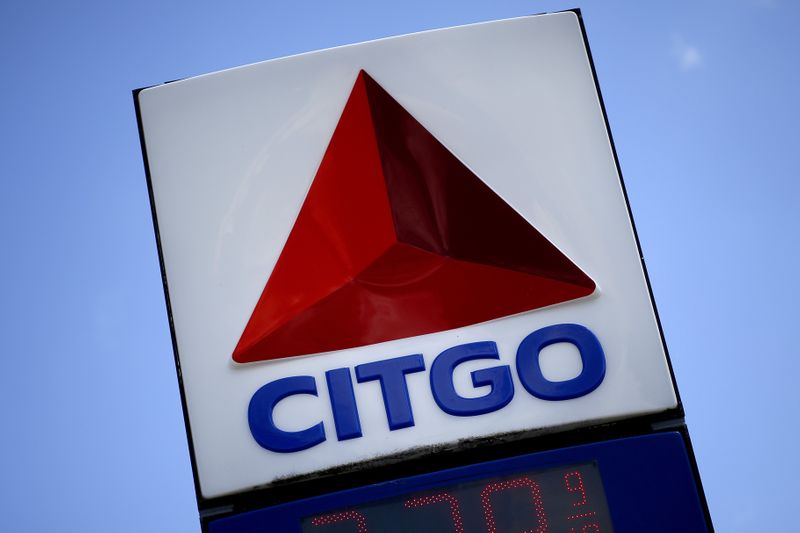By Luc Cohen
(Reuters) - Six executives of U.S. refiner Citgo have been jailed in Caracas on graft charges since 2017, but court documents seen by Reuters show that top Venezuelan officials were made aware of the deal that the country's top prosecutor accused the six executives of signing in secret.
The documents, which have not previously been reported, show that during at least two board meetings of state oil company Petroleos de Venezuela, which owns the U.S. refiner, top Venezuelan officials - including three ministers - were informed of the proposed deal for Citgo to borrow up to $4 billion.
The financing was never executed, and a Caracas court in late 2020 sentenced the six executives to between eight and 13 years in prison. Washington has accused Venezuelan President Nicolas Maduro of using the jailed executives as bargaining chips to seek policy concessions from the United States.
Maduro, who lost control of Citgo in 2019 to the Venezuelan opposition in the wake of U.S. sanctions on PDVSA intended to oust him, accuses the United States of seeking to foment a coup to gain control of Venezuela's oil.
All six executives - Jose Pereira, Jose Luis Zambrano, Alirio Jose Zambrano, Jorge Toledo, Tomeu Vadell and Gustavo Cardenas - denied the charges. The group includes five naturalized U.S. citizens and one permanent resident.
Prosecutors characterized the proposal for Frontier Management Group Ltd and Apollo Global Management (NYSE:APO) LLC to refinance Citgo's debt as "unfavorable to the company." On Nov. 21, 2017, a day after the men were arrested at a meeting at PDVSA's Caracas headquarters, Venezuela's chief prosecutor Tarek Saab told a news conference that they signed the deal "without even communicating or coordinating with the competent authorities."
However, meeting minutes entered into evidence and seen by Reuters show that on June 14, 2017, PDVSA's board agreed to negotiate with Apollo and Frontier, specifying that the board must approve final terms. Records also show that at a May 18, 2017 meeting, the board also discussed Citgo's refinancing plans.
PDVSA's board included then-Foreign Minister Delcy Rodriguez, who was also PDVSA's vice president of international affairs. Rodriguez is now Maduro's executive vice president.
Her name and those of Planning Minister Ricardo Menendez and former Food Minister Rodolfo Marco Torres, who were also on PDVSA's board, were included in the "c.c." line of both minutes. Reuters was unable to determine if Rodriguez, Menendez and Torres attended either one of those meetings.
"How could this all have been done behind the national executive's back - without its approval, to use the prosecution's words - if it is signed by or issued to the citizen Delcy Rodriguez?" a defense attorney for Pereira, Zambrano and Zambrano said in a Nov. 26, 2020 closing statement.
Another attorney for Pereira, Zambrano and Zambrano declined further comment, as did a lawyer for Toledo and Cardenas.
An attorney for Vadell referred Reuters to comments he sent to the judge at the close of the trial pointing to the absence of Vadell's name from the PDVSA minutes as further proof his client did not participate in the deal.
Neither Rodriguez, Torres, nor the planning ministry responded to requests for comment.
Venezuela's chief prosecutor's office, the information ministry, and PDVSA did not respond to Reuters' questions.
Citgo declined to comment.
Pereira, then Citgo's interim chief executive, acknowledged involvement in the refinancing talks, but said he was acting at the PDVSA board's instruction. The other five men said they were not involved in the deal, and that corporate finance was not among their job responsibilities.
The United States labels Maduro a dictator who rigged his 2018 re-election and uses the justice system to stifle dissent. Maduro says Washington wants to control Venezuela's oil reserves and aims to oust him in a coup.
The U.S. State Department has called the trial a "kangaroo court." A State Department spokesperson, asked about the documents showing Venezuelan officials knew of the negotiations, called the detentions "unjust and unlawful".
"We will continue to work with our allies to seek the release of the CITGO-6 and other unlawfully detained Americans abroad," the spokesperson said.

A person close to Apollo said the company studied the deal after being approached by Frontier, but decided not to participate. Dubai-based Frontier shut in October 2019, according to Dubai's public registry.